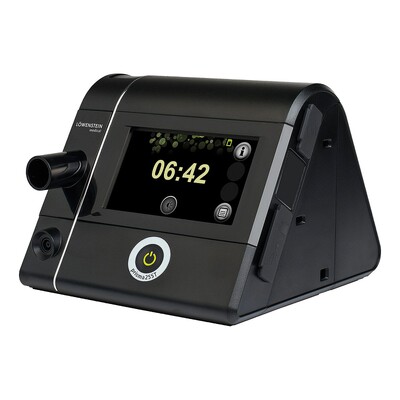
Lowenstein Prisma 25ST BiLevel (AUTO) S/T set with PrismaAQUA Humidifier & Heated Tube
SKU: LOWWM-29920-1111-KIT2
$3,850.00
CPAP Replacement Parts Finder
For people who need more advanced sleep apnea therapy, BiPAP (Bilevel Positive Airway Pressure) machines — also known as BPAP devices — offer a tailored solution. Unlike standard CPAP or APAP machines, which deliver a single or auto-adjusting pressure, BiPAP units provide two distinct pressure settings: one for inhalation (IPAP) and a lower one for exhalation (EPAP). This makes breathing much more comfortable, especially for those with higher pressure requirements, certain respiratory conditions, or complex sleep apnea.
At CPAP Club, our BiPAP machine range features trusted brands like Resmed, Lowenstein and Philips, known for their innovative technology, reliability, and comfort. These machines often include advanced data tracking, heated humidifiers, and user-friendly interfaces to support long-term therapy. Whether you’ve recently been prescribed bilevel therapy by a sleep specialist or upgrading your existing device, this collection gives you access to the right equipment to make your therapy effective and more comfortable.

Lowenstein Prisma 25ST BiLevel (AUTO) S/T set with PrismaAQUA Humidifier & Heated Tube
SKU: LOWWM-29920-1111-KIT2
$3,850.00

Lowenstein Prisma 25ST BiLevel (AUTO) S/T set with PrismaAQUA Humidifier, Heated Tube & Modem
SKU: LOWWM-29920-1111-KIT
$4,140.00

Philips DreamStation Auto BiPAP with Humidifier & Heated Tube
SKU: PHIAUX700T15
$2,095.00

Philips DreamStation Auto BiPAP with Humidifier, Heated Tube & 4G Modem
SKU: PHIAUX700T15C
$2,195.00

Philips DreamStation AutoSV 4G Cellular with Humidifier & Heated Tube
SKU: PHIAUX900T15C
$3,299.00

Philips DreamStation BiPAP AVAPS 4G Modem with Humidifier & Heated Tube
SKU: PHIAUX1131T15C
$3,299.00

PrismaCR AcSV Therapy set with PrismaAQUA Humidifier & Heated Tube
SKU: LOW29960-2111-KIT2
$3,960.00

ResMed Lumis 100 VPAP S 4G Wireless Connectivity, HumidAir & ClimateLineAir
SKU: RES28013
$2,750.00

ResMed Lumis 150 VPAP ST 4G Wireless Connectivity, HumidAir & ClimateLineAir
SKU: RES28125
$3,999.00

ResMed Lumis 150 VPAP ST-A 4G Wireless Connectivity, HumidAir & ClimateLineAir
SKU: RES28226
$4,599.00
A BiLevel Positive Airway Pressure (BiPAP or BPAP) machine delivers two different air pressures: IPAP (inspiratory) for inhalation and EPAP (expiratory) for exhalation. This dual-pressure design makes breathing easier and provides extra support for those who cannot tolerate continuous fixed pressure. Please be aware that BiLevel machines require a prescription from your doctor.
The machine senses each breath. It raises pressure on inhale (IPAP) to keep the airway open and lowers pressure on exhale (EPAP) for comfort. Certain models also include a backup rate to trigger breaths if breathing slows or stops.
| Feature | BiLevel/BPAP | CPAP | APAP |
|---|---|---|---|
| Pressure Levels | Two (IPAP & EPAP) | Single fixed | Auto-adjusting |
| Best For | Complex apnea, COPD | Stable obstructive apnea | Variable or changing needs |
| Backup Rate | Yes (select models) | No | No |
BiLevel (BiPAP/BPAP) machines provide separate inhale and exhale pressures and optional backup breathing support. They are ideal for individuals with central or complex sleep apnea, COPD, and other respiratory medical conditions.